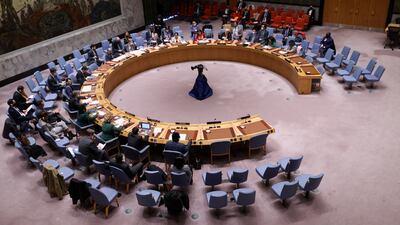Libya could again return to instability under two rival administrations, the UN has warned.
Undersecretary General Rosemary DiCarlo told the UN Security Council on Wednesday that elections are needed to unify the North African nation as soon as possible.
Ms DiCarlo said she is encouraged by support for a UN initiative to convene a joint committee from Libya’s rival House of Representatives and High State Council.
The goal is for both bodies to reach an agreement “on a constitutional basis that would lead to elections this year”.
The crisis erupted after Libya failed to hold its first presidential election on December 24 under a UN-led reconciliation effort.
The House of Representatives, based in the country's east, named a new interim prime minister, former interior minister Fathi Bashagha, in February.
The politicians claimed that the mandate of incumbent Prime Minister Abdul Hamid Dbeibah, who is based in the capital, Tripoli, expired when the election failed to take place.
However, Mr Dbeibah insists he will remain in office until elections are held. The High State Council, which advises his government, criticised the move by parliament to name a new prime minister before elections are held, describing it as “incorrect”.
On March 3, UN special adviser on Libya Stephanie Williams asked the speaker of the House of Representatives and the president of the High State Council to appoint six members to the joint committee and both responded favourably, said Ms DiCarlo.
She said the council nominated its representatives on Tuesday and the UN expects the House of Representatives to do the same in the coming days.
Separately, Ms Williams has offered to mediate between Mr Dbeibah and Mr Bashagha “to overcome the current political impasse”, Ms DiCarlo said.
Libya election cancellation in December - in pictures
Libya plunged into chaos after a Nato-backed uprising in 2011 toppled longtime dictator Muammar Qaddafi.
For years, the country has been split between rival administrations in the east and the west, each supported by an array of militias and foreign governments.
In April 2019, eastern-based Field Marshal Khalifa Haftar and his Libyan National Army launched an offensive to capture Tripoli. The campaign collapsed after Turkey and Qatar stepped up their military support for the Tripoli government.
Mediated by Ms Williams, who was acting UN envoy at the time, an October 2020 ceasefire agreement led to the formation of a transitional government led by Mr Dbeibah, and scheduled elections for December 24.
Worrying developments
Ms DiCarlo said the continuing standoff over “executive legitimacy” could again lead to two parallel administrations, “instability and, possibly, unrest and deal a severe blow to the prospect of elections”.
She said there have been “worrying developments” since March 1, when the House of Representatives held a vote of confidence on Mr Bashagha’s new government.
The vote was marred by “procedural flaws and threats of violence against some members of the chamber and their families”, according to reports received by the UN.
Ms DiCarlo pointed to the continuing suspension of flights between cities in the east and Tripoli, and “forces in western Libya supporting either side" moving on March 9-10 towards the capital”.
She said Ms Williams engaged both sides “and managed to reduce tensions”.
However, the UN political chief issued a warning that “Libya is now facing a new phase of political polarisation, which risks dividing its institutions once again and reversing the gains achieved over the past two years".








